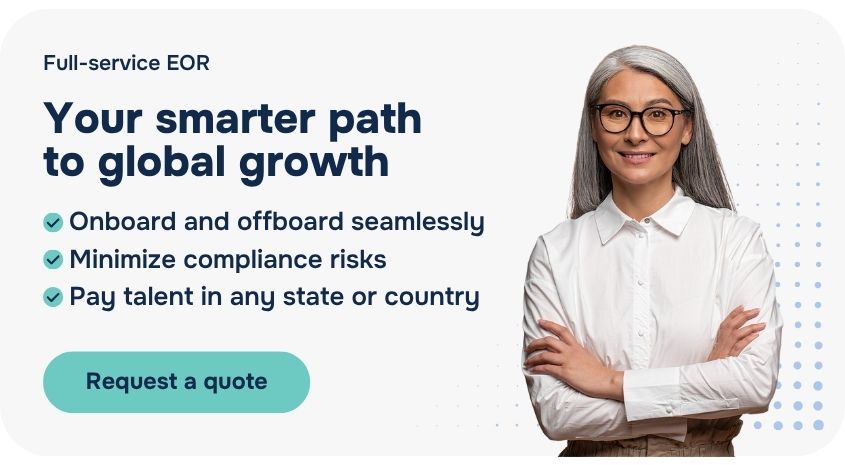Key takeaways:
- PEOs and EORs both support HR and compliance, but differ in structure, scope, and legal responsibility.
- PEO vs. EOR decisions hinge on your business needs. PEOs suit domestic companies with legal entities, while EORs enable fast, compliant global hiring.
- Full-service EORs like IES provide end-to-end support, global coverage, and transparent pricing, making them a strategic choice for scalable, compliant workforce expansion.
Managing a growing, distributed team often means comparing Professional Employer Organization (PEO) and Employer of Record (EOR) options. While both offer HR and compliance support, their structures and capabilities are significantly different.
Let’s break down when it makes sense to choose an EOR or PEO.
What Is a PEO?
The PEO business model is based on co-employment, where the PEO shares employer responsibilities with your company. These often include HR management, payroll, tax filing, benefits administration, and compliance — but only within the U.S.
PEOs work best for companies that already have a legal entity and want to streamline internal processes. Keep in mind:
- Employee minimums: Most PEOs require 5–10 employees.
- Plan participation: All employees must typically join the PEO’s plans, rather than a subset like contractors or remote workers.
- Entity registration: You still need to register your business in each hiring state.
- Insurance coverage: Some PEOs provide coverage like workers’ compensation and liability insurance; others expect you to manage it.
What Is an EOR ?
The major difference between a PEO and EOR is that an EOR acts as the full legal employer of your workforce, managing compliance, payroll, and benefits on your behalf. Unlike a PEO, an EOR doesn’t require you to establish a legal entity, making it ideal for companies hiring in new states or countries. Factors to consider:
- Employee minimums: EORs typically have no minimums and are great for temporary, contract, or remote workers.
- Plan participation: HR tasks can be outsourced to a full-service EOR while you maintain control of day-to-day operations.
- Business registration: EORs enable you to hire in new regions without forming a legal entity.
- Insurance coverage: EORs carry all necessary insurance, including workers’ compensation and liability.
But not all EORs offer the same value. Some providers operate as full-service partners with global compliance support, dedicated account teams, and end-to-end HR services — while others are software platforms that offer limited support and require your internal team to handle more of the heavy lifting. Understanding the difference is critical when evaluating which type of EOR is best for your business needs.
PEO vs. EOR: The Key Differences
Category |
PEO |
EOR |
| Legal Entity Required | Yes | No |
| Employment Model | Co-employment | Full legal employer |
| Geographic Scope | Primarily domestic (U.S.) | Domestic and global |
| Compliance Responsibility | Shared | Handled by EOR |
| Best For | Companies with existing entities | Companies expanding globally or hiring remote teams |
When to Utilize an EOR Over a PEO
Consider an EOR if:
- You’re hiring in locations where you don’t have a legal presence.
- You need to onboard global talent
- Your workforce includes contractors, full-time, hybrid, or remote roles.
- You want to skip the overhead of registering new entities.
Why Businesses Are Switching to IES for Full-Service EOR Solutions
For companies navigating domestic growth or international expansion, choosing the right employment model is critical. When speed, flexibility, and global compliance are priorities, an EOR — especially a full-service provider — often delivers greater long-term value than a PEO.
Innovative Employee Solutions (IES) offers a full-service EOR experience designed for scale, agility, and compliance. With over 50 years in the business, IES combines deep expertise with global reach.
Here’s what sets us apart:
- Global coverage: IES operates in all 50 U.S. states and 150+ countries.
- Risk protection: Expert compliance audits and classification guidance.
- All-in-one service: From onboarding to payroll and HR, IES covers the entire employment lifecycle.
- Transparent pricing: No hidden fees — just clear, trusted support.
Kara Hertzog is president of Innovative Employee Solutions (IES), a leading provider of remote and contingent workforce solutions, specializing in full-service global Employer of Record, Agent of Record, and Independent Contractor compliance services in the U.S. and 150+ countries. Founded in 1974, IES is a woman-owned business, certified by the WBENC and partners with companies to provide compliant employment solutions that empower people’s lives.






